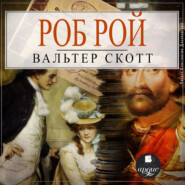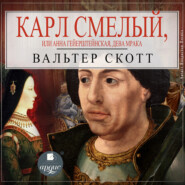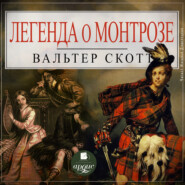По всем вопросам обращайтесь на: info@litportal.ru
(©) 2003-2024.
✖
The Black Dwarf
Настройки чтения
Размер шрифта
Высота строк
Поля
“You labour hard, Elshie,” he said, willing to lead this singular being into conversation.
“Labour,” re-echoed the Dwarf, “is the mildest evil of a lot so miserable as that of mankind; better to labour like me, than sport like you.”
“I cannot defend the humanity of our ordinary rural sports, Elshie, and yet – ”
“And yet,” interrupted the Dwarf, “they are better than your ordinary business; better to exercise idle and wanton cruelty on mute fishes than on your fellow-creatures. Yet why should I say so? Why should not the whole human herd butt, gore, and gorge upon each other, till all are extirpated but one huge and over-fed Behemoth, and he, when he had throttled and gnawed the bones of all his fellows – he, when his prey failed him, to be roaring whole days for lack of food, and, finally, to die, inch by inch, of famine – it were a consummation worthy of the race!”
“Your deeds are better, Elshie, than your words,” answered Earnscliff; “you labour to preserve the race whom your misanthropy slanders.”
“I do; but why? – Hearken. You are one on whom I look with the least loathing, and I care not, if, contrary to my wont, I waste a few words in compassion to your infatuated blindness. If I cannot send disease into families, and murrain among the herds, can I attain the same end so well as by prolonging the lives of those who can serve the purpose of destruction as effectually? – If Alice of Bower had died in winter, would young Ruthwin have been slain for her love the last spring? – Who thought of penning their cattle beneath the tower when the Red Reiver of Westburnflat was deemed to be on his death-bed? – My draughts, my skill, recovered him. And, now, who dare leave his herd upon the lea without a watch, or go to bed without unchaining the sleuth-hound?”
“I own,” answered Earnscliff; “you did little good to society by the last of these cures. But, to balance the evil, there is my friend Hobbie, honest Hobbie of the Heugh-foot, your skill relieved him last winter in a fever that might have cost him his life.”
“Thus think the children of clay in their ignorance,” said: the Dwarf, smiling maliciously, “and thus they speak in their folly. Have you marked the young cub of a wild cat that has been domesticated, how sportive, how playful, how gentle, – but trust him with your game, your lambs, your poultry, his inbred ferocity breaks forth; he gripes, tears, ravages, and devours.”
“Such is the animal’s instinct,” answered Earnscliff; “but what has that to do with Hobbie?”
“It is his emblem – it is his picture,” retorted the Recluse. “He is at present tame, quiet, and domesticated, for lack of opportunity to exercise his inborn propensities; but let the trumpet of war sound – let the young blood-hound snuff blood, he will be as ferocious as the wildest of his Border ancestors that ever fired a helpless peasant’s abode. Can you deny, that even at present he often urges you to take bloody revenge for an injury received when you were a boy?” – Earnscliff started; the Recluse appeared not to observe his surprise, and proceeded – “The trumpet WILL blow, the young blood-hound WILL lap blood, and I will laugh and say, For this I have preserved thee!” He paused, and continued, – “Such are my cures; – their object, their purpose, perpetuating the mass of misery, and playing even in this desert my part in the general tragedy. Were YOU on your sick bed, I might, in compassion, send you a cup of poison.”
“I am much obliged to you, Elshie, and certainly shall not fail to consult you, with so comfortable a hope from your assistance.”
“Do not flatter yourself too far,” replied the Hermit, “with the hope that I will positively yield to the frailty of pity. Why should I snatch a dupe, so well fitted to endure the miseries of life as you are, from the wretchedness which his own visions, and the villainy of the world, are preparing for him? Why should I play the compassionate Indian, and, knocking out the brains of the captive with my tomahawk, at once spoil the three days’ amusement of my kindred tribe, at the very moment when the brands were lighted, the pincers heated, the cauldrons boiling, the knives sharpened, to tear, scorch, seethe, and scarify the intended victim?”
“A dreadful picture you present to me of life, Elshie; but I am not daunted by it,” returned Earnscliff. “We are sent here, in one sense, to bear and to suffer; but, in another, to do and to enjoy. The active day has its evening of repose; even patient sufferance has its alleviations, where there is a consolatory sense of duty discharged.”
“I spurn at the slavish and bestial doctrine,” said the Dwarf, his eyes kindling with insane fury, – “I spurn at it, as worthy only of the beasts that perish; but I will waste no more words with you.”
He rose hastily; but, ere he withdrew into the hut, he added, with great vehemence, “Yet, lest you still think my apparent benefits to mankind flow from the stupid and servile source, called love of our fellow-creatures, know, that were there a man who had annihilated my soul’s dearest hope – who had torn my heart to mammocks, and seared my brain till it glowed like a volcano, and were that man’s fortune and life in my power as completely as this frail potsherd” (he snatched up an earthen cup which stood beside him), “I would not dash him into atoms thus” – (he flung the vessel with fury against the wall), – “No!” (he spoke more composedly, but with the utmost bitterness), “I would pamper him with wealth and power to inflame his evil passions, and to fulfil his evil designs; he should lack no means of vice and villainy; he should be the centre of a whirlpool that itself should know neither rest nor peace, but boil with unceasing fury, while it wrecked every goodly ship that approached its limits! he should be an earthquake capable of shaking the very land in which he dwelt, and rendering all its inhabitants friendless, outcast, and miserable – as I am!”
The wretched being rushed into his hut as he uttered these last words, shutting the door with furious violence, and rapidly drawing two bolts, one after another, as if to exclude the intrusion of any one of that hated race, who had thus lashed his soul to frenzy. Earnscliff left the moor with mingled sensations of pity and horror, pondering what strange and melancholy cause could have reduced to so miserable a state of mind, a man whose language argued him to be of rank and education much superior to the vulgar. He was also surprised to see how much particular information a person who had lived in that country so short a time, and in so recluse a manner, had been able to collect respecting the dispositions and private affairs of the inhabitants.
“It is no wonder,” he said to himself, “that with such extent of information, such a mode of life, so uncouth a figure, and sentiments so virulently misanthropic, this unfortunate should be regarded by the vulgar as in league with the Enemy of Mankind.”
CHAPTER V
The bleakest rock upon the loneliest heath
Feels, in its barrenness, some touch of spring;
And, in the April dew, or beam of May,
Its moss and lichen freshen and revive;
And thus the heart, most sear’d to human pleasure,
Melts at the tear, joys in the smile, of woman.
– BEAUMONT
As the season advanced, the weather became more genial, and the Recluse was more frequently found occupying the broad flat stone in the front of his mansion. As he sate there one day, about the hour of noon, a party of gentlemen and ladies, well mounted, and numerously attended, swept across the heath at some distance from his dwelling. Dogs, hawks, and led-horses swelled the retinue, and the air resounded at intervals with the cheer of the hunters, and the sound of horns blown by the attendants. The Recluse was about to retire into his mansion at the sight of a train so joyous, when three young ladies, with their attendants, who had made a circuit, and detached themselves from their party, in order to gratify their curiosity by a sight of the Wise Wight of Mucklestane-Moor, came suddenly up, ere he could effect his purpose. The first shrieked, and put her hands before her eyes, at sight of an object so unusually deformed. The second, with a hysterical giggle, which she intended should disguise her terrors, asked the Recluse, whether he could tell their fortune. The third, who was best mounted, best dressed, and incomparably the best-looking of the three, advanced, as if to cover the incivility of her companions.
“We have lost the right path that leads through these morasses, and our party have gone forward without us,” said the young lady. “Seeing you, father, at the door of your house, we have turned this way to – ”
“Hush!” interrupted the Dwarf; “so young, and already so artful? You came – you know you came, to exult in the consciousness of your own youth, wealth, and beauty, by contrasting them with age, poverty, and deformity. It is a fit employment for the daughter of your father; but O how unlike the child of your mother!”
“Did you, then, know my parents, and do you know me?”
“Yes; this is the first time you have crossed my waking eyes, but I have seen you in my dreams.”
“Your dreams?”
“Ay, Isabel Vere. What hast thou, or thine, to do with my waking thoughts?”
“Your waking thoughts, sir,” said the second of Miss Vere’s companions, with a sort of mock gravity, “are fixed, doubtless, upon wisdom; folly can only intrude on your sleeping moments.”
“Over thine,” retorted the Dwarf, more splenetically than became a philosopher or hermit, “folly exercises an unlimited empire, asleep or awake.”
“Lord bless us!” said the lady, “he’s a prophet, sure enough.”
“As surely,” continued the Recluse, “as thou art a woman. – A woman! – I should have said a lady – a fine lady. You asked me to tell your fortune – it is a simple one; an endless chase through life after follies not worth catching, and, when caught, successively thrown away – a chase, pursued from the days of tottering infancy to those of old age upon his crutches. Toys and merry-makings in childhood – love and its absurdities in youth – spadille and basto in age, shall succeed each other as objects of pursuit – flowers and butterflies in spring – butterflies and thistle-down in summer – withered leaves in autumn and winter – all pursued, all caught, all flung aside. – Stand apart; your fortune is said.”
“All CAUGHT, however,” retorted the laughing fair one, who was a cousin of Miss Vere’s; “that’s something, Nancy,” she continued, turning to the timid damsel who had first approached the Dwarf; “will you ask your fortune?”
“Not for worlds,” said she, drawing back; “I have heard enough of yours.”
“Well, then,” said Miss Ilderton, offering money to the Dwarf, “I’ll pay for mine, as if it were spoken by an oracle to a princess.”
“Truth,” said the Soothsayer, “can neither be bought nor sold;” and he pushed back her proffered offering with morose disdain.
“Well, then,” said the lady, “I’ll keep my money, Mr. Elshender, to assist me in the chase I am to pursue.”
“You will need it,” replied the cynic; “without it, few pursue successfully, and fewer are themselves pursued. – Stop!” he said to Miss Vere, as her companions moved off, “With you I have more to say. You have what your companions would wish to have, or be thought to have, – beauty, wealth, station, accomplishments.”
“Forgive my following my companions, father; I am proof both to flattery and fortune-telling.”
“Stay,” continued the Dwarf, with his hand on her horse’s rein, “I am no common soothsayer, and I am no flatterer. All the advantages I have detailed, all and each of them have their corresponding evils – unsuccessful love, crossed affections, the gloom of a convent, or an odious alliance. I, who wish ill to all mankind, cannot wish more evil to you, so much is your course of life crossed by it.”
“And if it be, father, let me enjoy the readiest solace of adversity while prosperity is in my power. You are old; you are poor; your habitation is far from human aid, were you ill, or in want; your situation, in many respects, exposes you to the suspicions of the vulgar, which are too apt to break out into actions of brutality. Let me think I have mended the lot of one human being! Accept of such assistance as I have power to offer; do this for my sake, if not for your own, that when these evils arise, which you prophesy perhaps too truly, I may not have to reflect, that the hours of my happier time have been passed altogether in vain.”
The old man answered with a broken voice, and almost without addressing himself to the young lady, —
“Yes, ‘tis thus thou shouldst think – ‘tis thus thou shouldst speak, if ever human speech and thought kept touch with each other! They do not – they do not – Alas! they cannot. And yet – wait here an instant – stir not till my return.” He went to his little garden, and returned with a half-blown rose. “Thou hast made me shed a tear, the first which has wet my eyelids for many a year; for that good deed receive this token of gratitude. It is but a common rose; preserve it, however, and do not part with it. Come to me in your hour of adversity. Show me that rose, or but one leaf of it, were it withered as my heart is – if it should be in my fiercest and wildest movements of rage against a hateful world, still it will recall gentler thoughts to my bosom, and perhaps afford happier prospects to thine. But no message,” he exclaimed, rising into his usual mood of misanthropy, – “no message – no go-between! Come thyself; and the heart and the doors that are shut against every other earthly being, shall open to thee and to thy sorrows. And now pass on.”
He let go the bridle-rein, and the young lady rode on, after expressing her thanks to this singular being, as well as her surprise at the extraordinary nature of his address would permit, often turning back to look at the Dwarf, who still remained at the door of his habitation, and watched her progress over the moor towards her father’s castle of Ellieslaw, until the brow of the hill hid the party from his sight.
The ladies, meantime, jested with Miss Vere on the strange interview they had just had with the far-famed wizard of the Moor. “Isabella has all the luck at home and abroad! Her hawk strikes down the black-cock; her eyes wound the gallant; no chance for her poor companions and kinswomen; even the conjuror cannot escape the force of her charms. You should, in compassion, cease to be such an engrosser, my dear Isabel, or at least set up shop, and sell off all the goods you do not mean to keep for your own use.”
“You shall have them all,” replied Miss Vere, “and the conjuror to boot, at a very easy rate.”
“No! Nancy shall have the conjuror,” said Miss Ilderton, “to supply deficiencies; she’s not quite a witch herself, you know.”
“Lord, sister,” answered the younger Miss Ilderton, “what could I do with so frightful a monster? I kept my eyes shut, after once glancing at him; and, I protest, I thought I saw him still, though I winked as close as ever I could.”

















